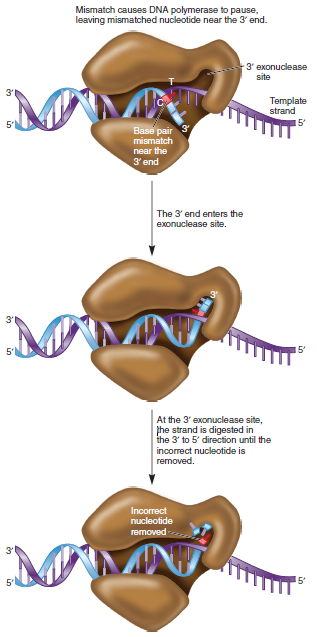
Genetics: Analysis and Principles 5th Edition by Robert Brooker
Edition 5ISBN: 978-0073525341
Genetics: Analysis and Principles 5th Edition by Robert Brooker
Edition 5ISBN: 978-0073525341 Exercise 5
The ability of DNA polymerase to digest a DNA strand from one end is called its exonuclease activity. Exonuclease activity is used to digest RNA primers and also to proofread a newly made DNA strand. Note: DNA polymerase I does not change direction while it is removing an RNA primer and synthesizing new DNA. It does change direction during proofreading
a. In which direction, 5 to 3 or 3 to 5 , is the exonuclease activity occurring during the removal of RNA primers and during the proofreading and removal of mistakes following DNA replication
B. Figure 11.17 shows a drawing of the 3 exonuclease site. Do you think this site would be used by DNA polymerase I to remove RNA primers Why or why not
FIGURE 11.17 The proofreading function of DNA polymerase. When a base pair mismatch is found, the end of the newly made strand is shifted into the 3 exonuclease site. The DNA is digested in the 3 to 5 direction to release the incorrect nucleotide and replication is resumed in the 5 to 3 direction.
a. In which direction, 5 to 3 or 3 to 5 , is the exonuclease activity occurring during the removal of RNA primers and during the proofreading and removal of mistakes following DNA replication
B. Figure 11.17 shows a drawing of the 3 exonuclease site. Do you think this site would be used by DNA polymerase I to remove RNA primers Why or why not
FIGURE 11.17 The proofreading function of DNA polymerase. When a base pair mismatch is found, the end of the newly made strand is shifted into the 3 exonuclease site. The DNA is digested in the 3 to 5 direction to release the incorrect nucleotide and replication is resumed in the 5 to 3 direction.

Explanation
(A)
The removal of RNA primers takes pl...
Genetics: Analysis and Principles 5th Edition by Robert Brooker
Why don’t you like this exercise?
Other Minimum 8 character and maximum 255 character
Character 255


